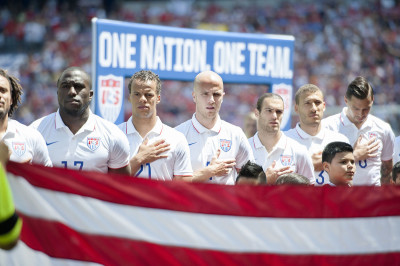
This summer, I had the privilege of attending a United States Men’s National Team soccer match at Gillette Stadium for the first time. The game was a match in the group stage of the CONCACAF Gold Cup against Haiti. It was, by far, the most patriotic experience of my entire life. The United States won the match 1-0, and clinched a pass to the knockout round of the tournament in the process.
However, the play I saw from the USMNT was anything but American. Against a much weaker Haitian opponent, the scoreline should have been at least triple what it was. The play was sloppy, there was a distinct lack of urgency, and frankly, the game was boring to watch, save for the last 10 minutes.
The U.S. bowed out of the tournament in the semifinals to Jamaica. Yes, Jamaica. And for those who don’t know soccer, Jamaica has some good players, but not a really good team. I was actually happy I didn’t watch this match because from what I heard, it was an abomination.
In not winning the 2015 Gold Cup, the United States, which won the tournament in 2013, now must play mighty Mexico in a CONCACAF playoff to decide who goes to the 2017 Confederations Cup in Russia. The way things are looking for the U.S. right now, coming off a narrow victory over lowly Peru and an embarrassing loss to Brazil, it seems Mexico is going to knock the doors off this American team.
That playoff is scheduled for Oct. 10, the exact same day as an Olympic Qualifying game. The U.S. will be sending its U-23 team to Olympic Qualifying, but they will be missing a few key faces. Namely, DeAndre Yedlin has joined the senior squad in the playoff game, leaving the U-23s shorthanded.
All in all, U.S. Men’s Soccer is becoming a joke. It’s sad but true.
Last year, I wrote a similar piece about how the U.S. was just one step away from becoming elite, and taking that step would mean winning the Gold Cup. Well, they never did take that step, and lo and behold, they didn’t win the Gold Cup either.
Things were even looking bright for the team with back-to-back road victories against European powerhouses Netherlands and Germany. The U.S. beat those two teams without their best players on the field.
Tim Howard wasn’t in goal, Clint Dempsey wasn’t up front, Jermaine Jones wasn’t patrolling the midfield and no big names were anchoring the defense. Players like Mix Diskerud and Bobby Wood, who both played the same amount as I did in the 2014 World Cup (hint, zero minutes), each scored a goal.
The way the U.S. played in the Germany game was better than when the two teams met in the World Cup in 2014. The Germans only won that game 1-0, but the U.S. looked lost in that iteration. However, the 2015 meeting, which wasn’t really about revenge, showed an American side that looked proud to represent their country. That pride showed in the way the U.S. embarrassed the World Cup champs.
So I guess the real question is, what happened between June 10, when the U.S. beat Germany, and July when they lost to Jamaica? The answer is simple: they were two different teams.
Manager Jurgen Klinsmann, who I believe has been doing a great job coaching, selected a squad of veterans to compete in the Gold Cup, while using a squad of young, fit and elite talent in the friendlies.
If it ain’t broke, don’t fix it Klinsy.
The U.S. took one step forward by employing elite young players in better fitness than some veterans, and it paid immediate dividends. However, in the Gold Cup, Klinsmann and the USMNT took two steps backwards and now have to play an in-form Mexico squad in a momentous playoff game.
Meanwhile, the young guns will be playing either in the U-23 qualifying match or in their respective domestic leagues. Instead, they should be on the field at the Rose Bowl, playing for the top squad and qualifying the U.S. for the Confederations Cup. But unfortunately, that won’t be the case.
The future seems bright for the USMNT, with many young and talented players waiting in the wings. However, it comes down to whether these guys will get the chance to don the red, white and blue now or in five years, and it really can’t wait that long.
The U.S. must start giving these younger players more caps in order to build up an experienced squad. The future begins now, and it must start soon before the program goes in a downward spiral very quickly.
Daniel Shulman is a sophomore at Boston University majoring in Journalism through the College of Communication. A native of Stoughton, Dan is a sports fanatic who loves everything Boston sports related. He is currently a Sports Hawk at the Boston Globe in the High School sports department. He is also a statistician for both Men’s and Women’s Soccer and Men’s Ice Hockey. Aside from writing, Dan has an interest in music, movies and cooking.











